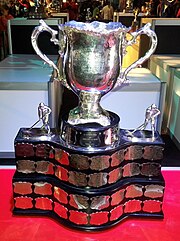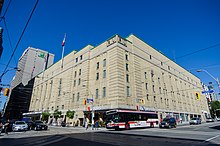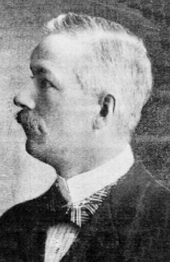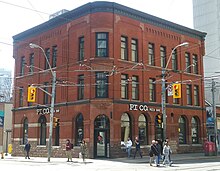Ontario Hockey Association
The senior-level men's league of the OHA is today composed of the six teams of Allan Cup Hockey.
Hewitt proposed an amendment to the constitution which would allow the executive to scrutinize any coach and decide on the registration.
[3] Two years later, Hewitt brought up the issue again and argued that, "the original intention of this rule was to control the [professional] coach, not exterminate him".
Hewitt promised to negotiate a better deal, in exchange for the contract with Arena Gardens to be renewed on a year-by-year basis.
Only three teams from Ontario ever won the Hardy Cup (that ran from 1968 to 1990), two from the OHA: Georgetown Raiders in 1982 and Dundas Real McCoys in 1986.
The league had become cost-prohibitive, and needed to cut costs and restructure senior ice hockey to compete for the Allan Cup.
The OHF was given the mandate to oversee hockey in Ontario, and be a review panel for three years to propose further restructuring if necessary.
[10] The OHA established bursaries as of the 1995–96 season, to counter the loss of players to scholarships in the United States.
[12][13] The suspension of the Derbys had to do with a stick-swinging incident in the final game of the league quarter-final against the Nobleton Devils.
[15] In 1987, the Port Elgin Bears withdrew from a Western Ontario Junior C Hockey League playoffs series due to perceived on-ice violence by the Hanover Barons.
The OHA investigated the incident, which received national publicity when Port Elgin's coach was supported by Otto Jelinek, the Canadian Minister of State for Fitness and Amateur Sport.
[16] Port Elgin team officials were given one-year suspensions when the OHA found no evidence to justify abandoning the series.
[17] When 13 people from the Tilbury Hawks were charged with sex-related crimes in 1994, the OHA sought to eliminate hazing from and suspended the team's officials for one year.
[18] Team trainer Paul Everaert and captain Ed Fiala pleaded guilty to their charges and were fined a total of $6,000.
The OHA stated it must educate its teams and players annually on acceptable practices to prevent incidents and change future behaviour.
[21] Each team was required to have a youth worker serving as a prevention services co-ordinator; and handbooks were given to players annually which covered hazing, alcohol, drug use, tobacco, and sexual harassment.
Several teams departed the MetJHL to join the Ontario Provincial Junior A Hockey League (OPJHL) which was affiliated with the OHA.
Teams in the proposed premier league would have been required to employ a full-time coach, doctor, nutritionist, and athletic trainers.
[33] Ladds felt that junior hockey in Ontario needed to be more attractive to players, who were departing the OHA for leagues elsewhere in Canada.
He stated that when he began working for the OHA, he dealt with "three or four bench-clearing brawls [each] weekend", but that culture had changed over time.
[32] He felt that the OHA had transitioned into being "a more nimble and responsive organization" than when he began; and was proud of his work to advance player safety and reduce on-ice injuries, which included increased penalties for rough play and certification programs for coaches and referees.








